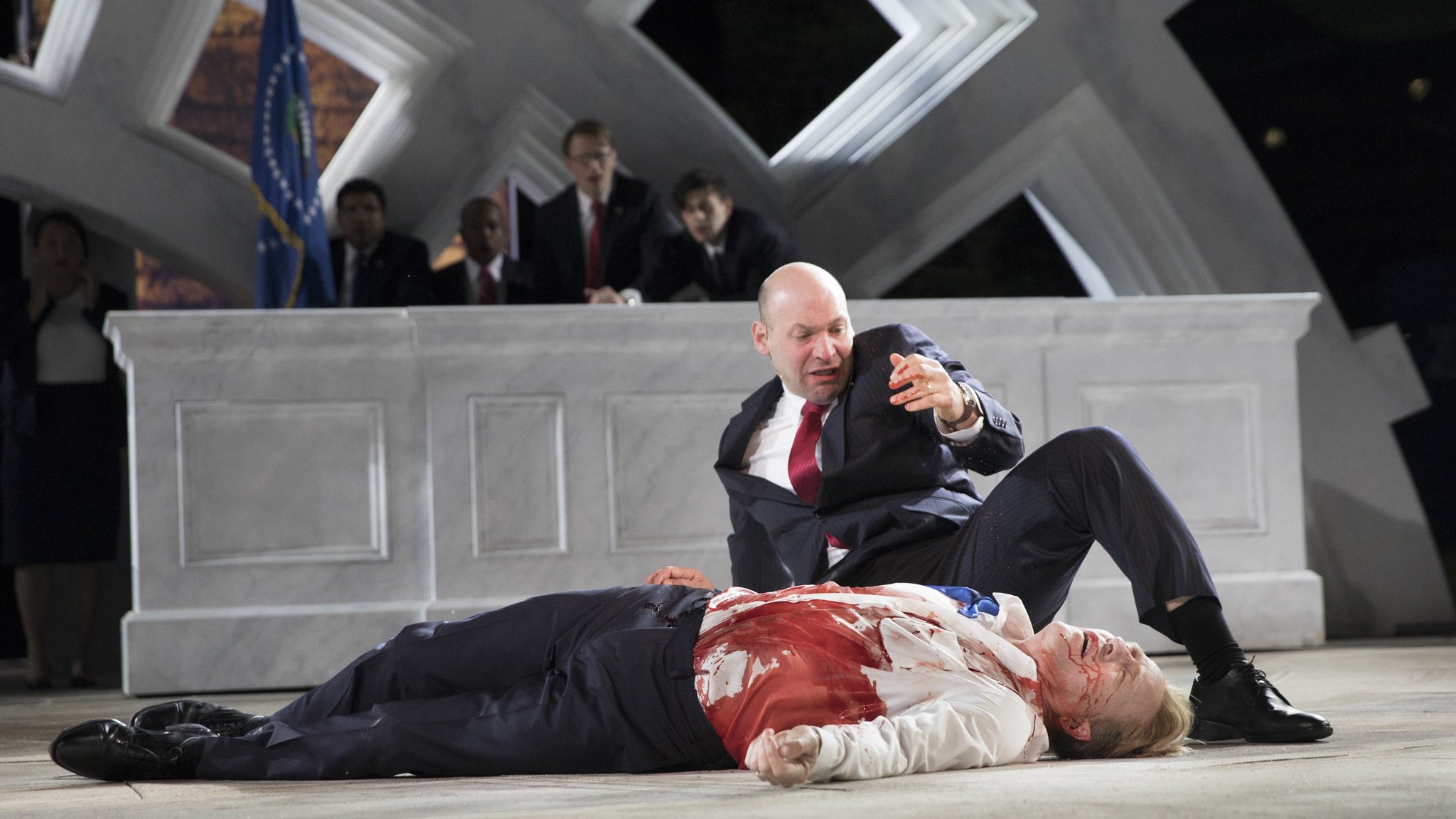Character assassination? The theatre takes on Trump
written for the Financial Times, 16 June 2017

Corey Stoll, top, and Gregg Henry in “Julius Caesar” at the Delacorte Theater in New York, May 21, 2017.
“Who is it in the press that calls on me?” Amid the roar of spectators a blond, coiffed demagogue picks out a heckler in the crowd, his overlong red tie swinging below his waist as he bestrides the stage. This is Julius Caesar, Roman general and title character of Shakespeare’s play. Except, of course, it’s Donald Trump. In Oskar Eustis’ open-air production for the Public Theater, Caesar-Trump’s every vulgar act bristles with the threat of an emerging dictatorship. We — the New York liberal audience gathered in Central Park — whoop and jeer.
No one, of course, goes to Julius Caesar to see a dictator die of old age. Eustis’ production depicts Caesar as Trump and thus it depicts the assassination of Trump: 23 stab wounds in a neo-Roman Capitol. As the liberal assassin Brutus, House of Cards star Corey Stoll ritualistically bathes his hands — “up to the elbows” — in gory stage blood beside a tyrant’s fallen body. NYC theatregoers love it; Fox News is outraged. Donald Trump Jr weighs in on Twitter: “I wonder how much of this “art” is funded by taxpayers? Serious question, when does “art” become political speech & does that change things?”
The question of who should fund America’s theatres has been fraught for years. But contrary to the claim of the younger Trump, the Public Theater’s Julius Caesar does not directly owe a cent to the US taxpayer. The National Endowment for the Arts, a government agency whose funding Trump Sr has abortively proposed to eliminate, was quick this week — some in New York say cowardly — to distance itself from the organisation. It stressed that previous grants had been given only through an intermediate producing festival: “No NEA funds have been awarded to support this summer’s Shakespeare in the Park production of Julius Caesar and there are no NEA funds supporting the New York State Council on the Arts’ grant to Public Theater or its performances.”
What the Public Theater does rely on heavily, like many US arts organisations, is private philanthropy and corporate sponsorship. Within 24 hours of Trump Jr’s tweet, both Delta Air Lines and Bank of America had withdrawn their financial support of this production. Delta accused the Public of crossing the line “on the standards of good taste”. The “graphic staging” of a politician’s murder, it said, “does not reflect Delta Air Lines’ values”.
What kind of production of Julius Caesar, a nation wondered, would reflect Delta Air Lines’ values? Even a schoolboy reading should have taught Delta’s spokesperson that Shakespeare’s play is hardly an advertisement for political assassination. By the fifth act, conspirators Cassius and Brutus lie dead by suicide, the republic submerged into tyranny as Caesar’s heirs impose order and take revenge. As the director Eustis told an audience on opening night: “Anybody who watches this play tonight — and I’m sorry there’s going to be a couple of spoiler alerts here — will know that neither Shakespeare nor the Public Theater could possibly advocate violence as a solution to political problems, and certainly not assassination.”
This is not a new observation, from Eustis or any other Shakespearean critic. Nor is it new for contemporary stagings of Shakespeare to draw parallels with modern politicians. As Tony Blair’s early mystique faded, a 2001 Royal Shakespeare Company production of Hamlet reimagined Elsinore as a corporate nexus of New Labour spin-doctors. (“He popped in between the election and my hopes,” groaned Sam West’s Hamlet about Larry Lamb’s telefriendly Claudius.) Eleven years later, the RSC was at it again, when Greg Doran’s Julius Caesar transferred the Roman civil war to the North Africa of the Arab Spring, explicitly inspired by the bloody aftermath of Colonel Gaddafi’s death in Libya.
Depicting the murder of a living president on stage is, however, a step further than most modern directors go. When Doran staged a scene that looked very like Gaddafi’s murder, the man himself had already been lynched by his captors. British audiences watched with guilty flashbacks to half-remembered news bulletins from a foreign land. The production awakened a lost political history, rather than a sense of all-too-visceral wish-fulfilment.
Many at the Public have cited a legitimising precedent: a staging at the Guthrie Theatre in Minneapolis, five years ago, in which Caesar was not a Trump stand-in but an African-American Barack Obama figure, his political charisma signified by his crowd-pleasing skill with a basketball. (The American Conservative magazine called it “riveting”.) Delta sponsored that production, too. But the Trump administration has a thinner skin than the Obama White House did and a particularly fraught relationship with New York, disapproving parent city to its least favourite son. The Public is New York’s most high-profile subsidised venue. To the now-embattled Trump camp, this Julius Caesar feels like a shot across the bows from the central city of organised opposition to the president.
The stakes feel higher, too. This president faces not only the death-threats, insults and smears that constituted Obama’s daily inbox, but the increasingly loud rumblings of impeachment. Liberal opponents have not helped themselves by providing other opportunities for the former Miss Universe owner to play the outraged victim. During the week of Julius Caesar’s last previews, comedian Kathy Griffin inspired opprobrium from across the political spectrum when she shared a promotional image of herself holding an image of President Trump’s severed head, Isis-style, and was immediately sacked as a contributor to TV network CNN. Asked about the Griffin controversy by the New York Times, even Julius Caesar’s director distanced himself: “We knew we weren’t doing anything like that. We were doing Shakespeare in the Park, for God’s sake.”
Friends of the Public Theater have been quick to emphasise the intellectual sophistication of Eustis’ work: “The theatre’s responsibility is to be morally energetic, not morally comfortable,” says David Leveaux, the British-American who directed the Public Theater’s production of Plenty, with Rachel Weisz, last year, and most recently directed Daniel Radcliffe in London at the Old Vic. “That, after all, is Shakespeare’s theatre — base, sublime, lofty, lyrical, obscene and often violent . . . My own experience of working at the Public was of a theatre committed to trying to capture the sound and imagery and voices of modern America. In all its dynamism and variety and divisions.”
But is Eustis’ production really that subtle? It is certainly vibrantly staged: watching Caesar’s cronies rally before TV cameras, their Roksanda-clad wives waving beside them, the darkness and efficiency of the modern media-political complex feels urgently real. Eustis has assembled a cast without a weak link; his production also richly clarifies the rhythm and meaning of Shakespeare’s metaphors of power. Elizabeth Marvel’s female Mark Antony whips up a crowd with the faux modesty of a southern Sarah Palin. “I am no orator as Brutus is,” she tells us. And rising to a roar: “I only speak right on!” This is a masterclass in modern crowd manipulation.
Yet this Julius Caesar is still pantomime, not drama. Such is the price Eustis pays for casting Gregg Henry as a Trump impersonator so on-the-nose he could have walked off the set of the TV sketch show Saturday Night Live. Melania, too, is mocked rather than understood, in Tina Benko’s heavily accented vision of Caesar’s wife Calpurnia. (Nikki M James gives a more nuanced portrayal of a modern woman trapped by machismo politics, as Brutus’ self-harming wife Portia.) Shakespeare’s text adapts easily to such a satirical vision. “Let me have men about me who are fat,” snaps Henry’s Caesar (President Trump is said to have rejected John Bolton’s pitch to be secretary of state on the basis he disliked the former UN ambassador’s moustache).
Eustis only occasionally has to add words to Shakespeare’s text. At one point Casca mocks the populace for their fawning devotion to their candidate: “Had Caesar stabbed their mothers — on Fifth Avenue — they would have done no less.”
How we laugh. But the result is a flattened sense of Julius Caesar’s ambiguities; a less subtle play. Frankly, casting Donald Trump as Julius Caesar is unfair to Caesar; the latter was at least a war hero. More importantly, we lose any sense of Brutus’ deep conflict over his betrayal of old friend Caesar. Why was a thoughtful servant of democracy ever this man’s ally?
***
Pages: 1 2






